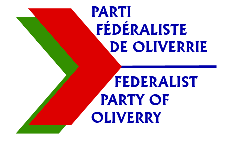Difference between revisions of "Parti Federaliste de Oliverry"
(→Runners for prime minister) |
|||
| Line 13: | Line 13: | ||
| '''Party leader''' || [[Jean Levasseur]] | | '''Party leader''' || [[Jean Levasseur]] | ||
|- | |- | ||
| − | | '''Party's candidate for presidency''' || | + | | '''Party's candidate for presidency''' || Vacancy |
|- | |- | ||
| '''Motto''' || La réussite passe par le fédéralisme | | '''Motto''' || La réussite passe par le fédéralisme | ||
Revision as of 04:54, 17 December 2005

| |
| Established | 1997 |
| Economic ideology | Fiscal conservatism |
| Social ideology | Socialist/Federalist |
| Party leader | Jean Levasseur |
| Party's candidate for presidency | Vacancy |
| Motto | La réussite passe par le fédéralisme |
Contents
History
The History of this party is very vague. In 1997, Olivier Turcotte, a young person from St-Jean-de-la-Route, decides to start a party that will really reflects the population's point of view. Rapidly, in 1998, after having reunited enough candidates, he founds the Federalist Party of Oliverry, a new party to protest against the nearly-dictatorial government of Dick Jouhive, president from the Green-Marijuana party. The tactic at this time was: "A vote for the Federalists means a vote for the population." The tactic worked perfectly as they gained 4 seats at the partial election of May 1999. In June 2000, elections were declared. The Federalist party wins with the biggest margin ever seen. Olivier Turcotte wins with 54% of the votes. At the parliament, the result was nearly the same: 56% of the seats were occupated by a Federalist. He reformed the Oliverrian politics by giving to provinces a provincial government. The title of the President was changed to "Grand Federator" and each provincial government's chief was given the title of "Little Federator". But, in 2004, many people were not happy of the Federalist politics. But, because they were happy of the decentralization of the powers the people reelected the party. This was enough for Olivier Turcotte to declare himself emperor. So, he still accepted the political parties, but they were not allowed to run in the federal. In 2007, after the Limbrogidlian revolt, Olivier I saw that his life was in danger and retired from political life. The second Republic was claimed by the chamber of parliament and Sam Gagnon took the interim before the elections. He won them, and Oliverry was still ran by a Federalist. But, in 2011, date of the elections, the Federalist Party got a big opposition from the Communist Party, Sam Gagnon winning to his communist rival by only 1 percent.
Chiefs of the party
Runners for presidency
- 1998 - 2004: Olivier Turcotte
- 2007 - 2014: Sam Gagnon
- 2014 -: To be determinated
Runners for prime minister
- 1998 - 2007: Sam Gagnon
- 2007 -: Jean Levasseur
Election results
| Year | Type of the election | Number of seats won | Number of seats contested | Percentage of the seats | Runner for presidency | Chief of the party |
| May 1999 | Partial | 4 | 4 | 100% | Nobody | Nobody |
| June 2000 | General | 76 | 136 | 55,88% | Olivier Turcotte | Sam Gagnon |
| December 2003 | Partial | 0 | 2 | 0% | Nobody | Nobody |
| June 2004 | General | 65 | 136 | 47,79% | Olivier Turcotte | Sam Gagnon |
| April 2007 | General | 80 | 136 | 58,82 | Sam Gagnon | Jean Levasseur |
| August 2009 | Partial | 2 | 6 | 33,3% | Nobody | Nobody |
| May 2011 | General(Oliverry) | 64 | 176 | 36,36% | Nobody | Jean Levasseur |
| May 2011 | General(Limbrogidlia) | 14 | 80 | 17,5% | Nobody | Jim Xioult |
| May 2011 | General(Total) | 78 | 256 | 30,47% | Sam Gagnon | Nobody |
NB: When there was nobody participating, it was simply because there wasn't any necessity of having a candidate at this time. In the 2011 election, the president was running for the presidency of both Oliverry and Limbrogidlia, so both nations' results were taken into account. That's why "Nobody" ran for presidency neither in Oliverry nor in Limbrogidlia.
